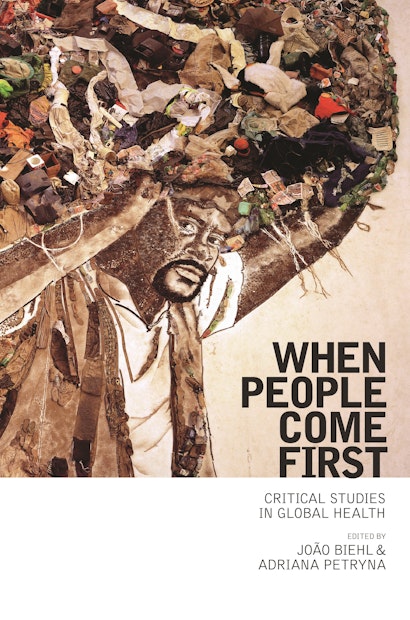When People Come First critically assesses the expanding field of global health. It brings together an international and interdisciplinary group of scholars to address the medical, social, political, and economic dimensions of the global health enterprise through vivid case studies and bold conceptual work. The book demonstrates the crucial role of ethnography as an empirical lantern in global health, arguing for a more comprehensive, people-centered approach.
Topics include the limits of technological quick fixes in disease control, the moral economy of global health science, the unexpected effects of massive treatment rollouts in resource-poor contexts, and how right-to-health activism coalesces with the increased influence of the pharmaceutical industry on health care. The contributors explore the altered landscapes left behind after programs scale up, break down, or move on. We learn that disease is really never just one thing, technology delivery does not equate with care, and biology and technology interact in ways we cannot always predict. The most effective solutions may well be found in people themselves, who consistently exceed the projections of experts and the medical-scientific, political, and humanitarian frameworks in which they are cast.
When People Come First sets a new research agenda in global health and social theory and challenges us to rethink the relationships between care, rights, health, and economic futures.
"When People Come First is a welcome examination of 'the actual impacts of [global health] initiatives on care, health systems, and governance.'. . . The authors' empirical accounts of the complexities of the global health landscape expose a litany of assumptions that drive global health and demonstrate why we must be suspicious of these."—Nicole S. Berry, Science
"When People Come First would be a valuable accessory in any global health practitioner's toolkit, and essential reading for global health students."—Jocalyn Clark, PLoS Speaking of Medicine blog
"When People Come First, edited by medical anthropologists Biehl and Petryna, is an informed, critical examination of current, compelling global health issues; it successfully dispels the notion that a single community or country is alone in its health efforts."—Choice
"When People Come First sets a new research agenda in global health and social theory and challenges us to rethink the relationships between care, rights, health, and economic futures."—World Book Industry
"When People Come First presents an important contribution to debates surrounding the concept of 'evidence' in global health policy and practice. . . . This anthology, and the debates which it will surely ignite, provides a solid foundation for exploring an approach to global health where people come first."—Sarah Jeavons, New Genetics and Society
"When People Come First is a strong and ethnographically grounded collection featuring many of the most talented theorists and writers currently studying global health."—Svea Closser, American Ethnologist
"Like with any good ethnography, the stories are real, often troubling, and evocative of real lives in real places. They stimulate anger and outrage. It is a hard book to put down."—Craig R. Janes, Medical Anthropology Quarterly
"[An] impressive book . . . rich in nuance and complexity."—Salmaan Keshavjee, Lancet
"This text has significant potential as a teaching resource both for clinical family medicine and for those exploring global health—the problems it addresses are real, the need for ethnographic rather than program-focused understandings of local reality is well articulated, and the challenge presented by the book to look at things differently is valuable to those learning to practice in any setting."—William Cayley Jr, MD, MDiv, Family Medicine
"Rapid social change is the one constant in this ambitious volume. These pages come to life and are wrenching because they never seek to elide the messiness of experience. With ethnographic evidence from some of the most important theaters of global health, the authors give us a sound understanding of the collision of a crushing burden of disease, emerging audit cultures, and new therapeutic regimes. As case studies rooted in long familiarity but alive to overwhelming transformation, they will stand the test of time."—Paul Farmer, Harvard Medical School and Partners in Health
"Award-winning medical anthropologists João Biehl and Adriana Petryna have produced a stunning and original collection. In an era of market-driven global health interventions, this volume demonstrates anthropology's unique contribution as a critically evaluative and humanizing discipline."—Marcia C. Inhorn, Yale University
"Global health as a field is being redefined, from one based on narrow interventions to a more holistic focus on delivering value to patients. This requires a deep understanding of how to connect care delivery to patients, their families, and the local country context. When People Come First is an indispensable resource in creating the global health delivery systems of the future. Its rich case studies are essential for practitioners and scholars in designing and implementing care processes that really work."—Michael E. Porter, Harvard Business School
"Global health is a big business: the World Bank, the World Health Organization, the United Nations, the Gates Foundation, academia, pharmaceutical companies, and thousands of NGOs are working to improve health around the world. Lost among these powerful groups, the supposed beneficiaries have little to say. When People Come First tells us why and how to make global health better. It is an eye-opener, especially for those of us locked into our comfortable disciplinary silos."—Angus Deaton, Princeton University
"When People Come First is a truly pioneering volume that will change the kind of work that is done in the anthropology of global health in the future."—Richard G. Parker, Columbia University
"When People Come First sets an ambitious agenda that emphasizes ethnography as an important methodological tool for better understanding health services at all levels of analysis, including at the stages of service provision, medicine marketing, and policymaking. There is no doubt that this book will be read and widely cited by scholars of global health."—Nitsan Chorev, Brown University

